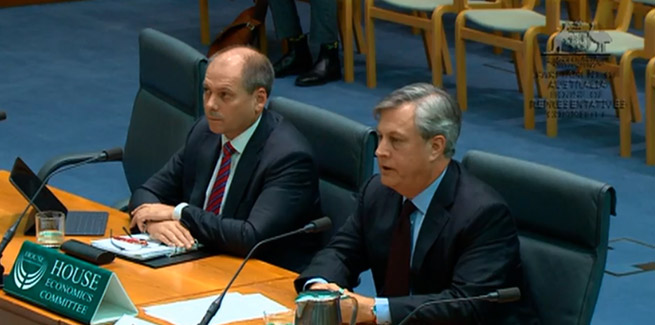The major bank is not too fazed by the fall in house prices in Australia, with its CEO explaining that a sudden spike in unemployment would be more concerning.
Appearing before the House of Representatives’ Standing Committee on Economics on Friday (8 March), Westpac chief executive Brian Hartzer and chief financial officer Peter King were questioned as to whether the major bank is “concerned” by the nationwide drop in house prices, especially as 65 per cent of its loan book is comprised of mortgages.
The CEO pointed out that in Sydney and Melbourne, there was a “very substantial run-up in house prices over the last five, six, seven years”, and so people who purchased their homes four to five years ago are “still well-ahead”.
“When we look at the level of equity in our portfolio relative to the loans, there’s still quite a lot of equity support in people’s homes,” Mr Hartzer continued.
When Matt Thistlethwaite, vice chair of the committee and member for Kingsford, asked for clarification on how far house prices would need to fall before Westpac begins to worry, the CEO responded that it would take a “big spike in unemployment” for the bank to get “very concerned”.
“Any fall is a concern, particularly for people who made an investment in housing, so we don’t like to see a fall,” he said.
“But... there’s a positive sense of it as well, which means more first-time home buyers can get into the market.”
The CFO expressed a similar sentiment, saying: “If people have jobs and have income, then they’ll be able to repay the loan, and that’s what we look at the most in terms of the quality of the book and how it’s going to behave over time.”
Mr King insisted that Westpac’s loan portfolio is “performing well”, noting that a little over 400 properties are in the bank’s possession, compared to 1.6 million mortgage accounts.
The major bank’s CEO also claimed that the decline in house prices has less to do with the banks tightening credit, and more to do with “housing supply and demand factors”.
“For Westpac, approval rates have been steady, and our risk appetite hasn’t changed significantly in the last 12 months. In the last financial year, we lent more than $75 billion to customers to buy homes and $7.3 billion to small businesses,” Mr Hartzer said in his opening statement to the committee.
According to the chief executive, the bigger issue is that “not as many people, particularly investors, are applying for loans”.
“We see this as a natural response to a recent increase in the supply of housing, along with a fall in foreign investor demand and increased uncertainty about future returns from housing investment after a significant run-up in prices,” Mr Hartzer said.
“In other words, what we’re seeing is a cyclical adjustment after six strong years of growth, that so far regulators and banks are managing reasonably well.”
While the MP pointed that a number of parties, including the Reserve Bank of Australia, International Monetary Fund, and the OECD, have revised their growth forecasts for Australia, the Westpac CEO noted that “the economy is still growing” even if at a slower pace.
“Having said that, uncertainty about the future direction of regulation and government policy is having an effect on business and consumer confidence,” Mr Hartzer said.
“As further reforms and legislative changes are enacted, it will be important to avoid changes that unintentionally impact the availability or pricing of credit, or have detrimental effects on the very consumers they are designed to protect.”
[Related: RBA insists housing slump won’t ‘derail’ economy]

